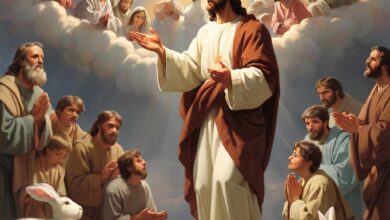34th Sunday
OUR LORD JESUS CHRIST KING OF THE UNIVERSE.
Ez 34: 11-12, 15-17/ Ps 23: 1-6 / 1 Cor 15: 20-26, 28/ Mt 25: 31- 46
Theme: Jesus Christ the King
Today is the last Sunday in the Liturgical Year, a day we refer to as Christ the King Sunday. On this Sunday, we celebrate a king- our Lord Jesus Christ King of the Universe. We celebrate a king who rules over all creatures, one who is remarkably different from every earthly king. He is a king who did not ascent to his throne by wars or succession; he is a king whose kingdom never passes away; he is king who came to serve all, even his enemies; he is a king who exalts his servants rather than dominating them; he is a king who is personally interested in the well-being of each of his subjects and will come at the end of time to reward them; he is Christ Jesus the Universal King. As we celebrate the Solemnity of Christ the King, we look into the future, to our final end where we will share in the Kingdom of Christ our king.
The feast of Christ the King was instituted by Pope Pius XI in 1925 as the last Sunday in October. In 1960 Pope Saint John XXIII classified it as a feast of the first class. In 1969, Pope Paul VI made three changes to the celebration. First, he moved the feast to its current place – the last Sunday before Advent. Second, he expanded the name to “Our Lord Jesus Christ King of the Universe.” Third, he raised the feast to the status of a Solemnity.
My dear brothers and sisters in Christ, today’s celebration offers us a lot to reflect on and I will want us to consider three of them.
The first is that we cannot leave out Christ in anything we do. Christ is King over all, he is a universal king. It is a worry when some governments, politicians, and lawmakers advocate the absolute secularization of states. Jesus Christ must take center stage in our politics, policies and businesses. We must acknowledge the kingship of Christ in every sphere of our lives. Especially in our country Ghana we need to rediscover the kingship of Christ over our nation. Why is corruption on the increase? Why the heightened apathy about patriotism? Interestingly, over 70% of the population is Christian. Maybe we have drawn a line demarcating the sphere of acknowledgment of the kingship of Christ and where he is not. When we take seriously the fact that Christ is king over our nation we will remain loyal servants of our nation. Being loyal servants requires that we uphold the values of truth, integrity, and transparency. Certainly individual citizens make up a nation. The measure in which we extend the kingship of Christ to our politics and nation- building will depend on how much Christ we possess and are possessed by him. We cannot give what we do not have. If Christ isn’t the king of our lives, we cannot extend his reign to other areas of our lives. Is Christ the king of your whole life or only a part of your life? Are you convinced you need Christ to be king of your lives? Living out the gospel values of love, peace, tolerance, chastity, and obedience identifies us with Christ the king.
The second point for reflection is how we exercise authority. From our first reading we see how God exercises his authority. He exercises his authority by take up the shepherding role. As a shepherd he will look after and tend his sheep, he will rescue and pasture them (Eze 34: 11-12). At a point when God’s people were suffering because of their bad leaders, God decided to intervene and shepherd his own people. Our exercise of authority must not lead to the suffering of others. We must serve as guides, helpers, protectors of others. Others must become better persons by virtue of our exercise of authority. The discipline of Sociology speaks of the “significant other”. This means a person who has great influence on one’s behavior and self-esteem. How we use authority, live our lives- as parents, teachers, religious leaders and government officials has a lot of influence on those who consider us as their significant others. Our use of authority must enrich the lives of others and not impoverish them. The husband who routinely lifts his hand against his wife is abusing his authority, the religious leader who exploits his congregation is abusing authority, and the government official who is corrupt is no different. When we abuse the authority given to us we are influencing others to do same in the near future. Jesus Christ destroyed evil and death in order for us to be better persons. As the second reading puts it, we are made alive by the resurrection of Christ. As king, Christ atones for our sins so that we have become adopted sons and daughters of God. His kingship can only make us better citizens of God’s kingdom. In a similar manner, whatever authority we have it is meant for the service and welfare of others.
A third point for reflection is the judgment at the end of time. Every servant will be accountable to the king. The Gospel highlights the judgment at the end of time. The imagery of the separation of the sheep from the goats is employed here, the sheep on the right and goats on the left. The criteria for the separation are anchored on what each has done or not done. The criteria go beyond just mere recital of creed, action also is required. And so the king is more interested in those who fed him, gave him a drink, welcomed him, clothed him, nursed him or visited him in prison. Indeed Jesus has a preferential option for the poor. Those of us who have decided to follow Jesus the king must also respond to the needs of those with whom the king identifies the most namely, the poor. Those who are attentive to the needs of the poor will inherit the eternal kingdom while those who are not will be condemned to eternal damnation. Every thought about judgment at the end of time reminds us that there is a consequence in everything we do or not do. The things we did which we shouldn’t have done and those we did not do which we should have done, both carry eternal consequences. The whole point about judgment is imitation of the king, Jesus. Jesus never left anyone who needed help unaided. He was not subject to the sin of omission. I think this is one of the sins common among many a people. What should you have done to help your brother, sister, neighbor, and country which you did not do; and what did you do which you shouldn’t have done? The king will demand an account of both. The Solemnity of Christ the king should imprint in our minds that the king will come again and, this time as a judge.
As we draw the curtain on Liturgical Year, let us always keep in mind that we only find our freedom in Christ the King. Our freedom lies in our recognition and the subsequent invitation of the king into our lives, politics, and families. I invite you to make the Opening Prayer of this Solemnity your own: “Almighty ever-living God, whose will is to restore all things in your beloved Son, the King of the universe, grant, we pray, that the whole creation, set free from slavery, may render your majesty service and ceaselessly proclaim your praise. Through our Lord Jesus Christ, your Son, who lives and reigns with you in the unity of the Holy Spirit, one God, for ever and ever.” Amen.

